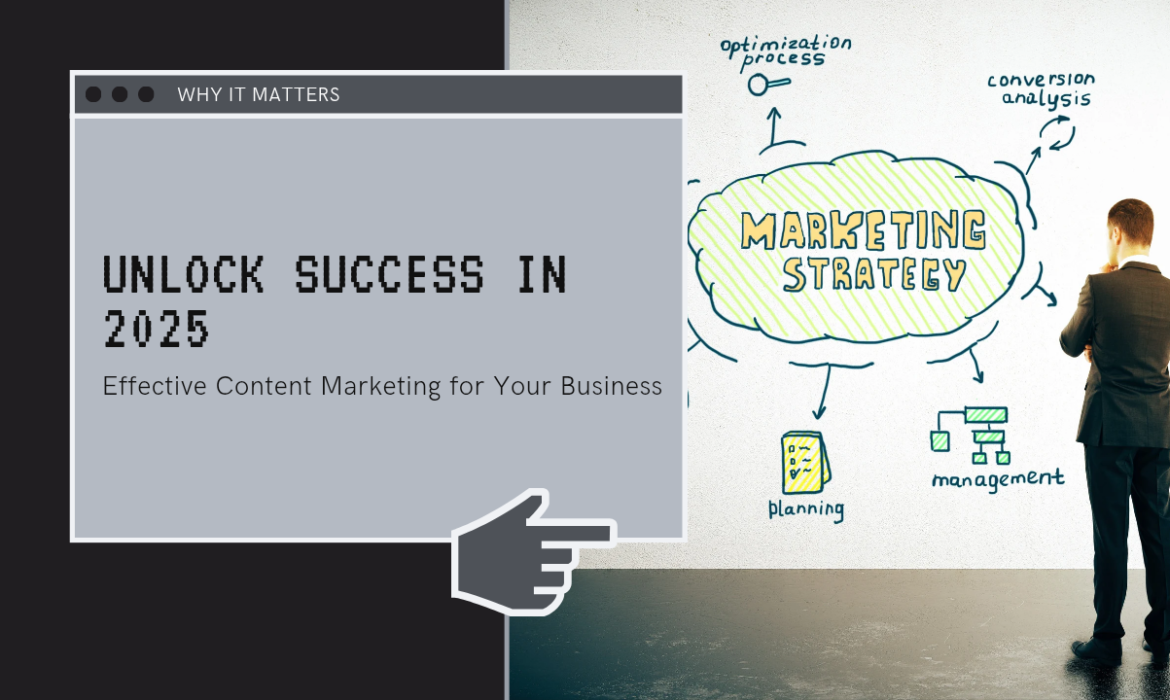081-4797-7173
In an era where businesses are increasingly looking for attention in a crowded digital marketplace, content marketing is now not just a trend; it’s a necessity.
Content Marketing is defined as the strategic creation and sharing of valuable, relevant, and consistent content to attract and retain a clearly defined audience, it has proven to be a powerful tool for businesses of all sizes. It not only helps build meaningful connections with customers but also drives measurable results that align with long-term business goals.
It’s 2025, and the importance of content marketing has reached new heights. With the digital landscape continuing to evolve at an unprecedented
pace, businesses are faced with a global economy that demands innovation, adaptability, and authenticity.
Emerging technologies like artificial intelligence (AI), augmented reality (AR), and automation are reshaping how content is created, distributed, and consumed. At the same time, consumer behavior is shifting toward an increased desire for personalized and value-driven experiences.
In this discussion, we’ll explore why content marketing remains an indispensable strategy for your business in 2025.
From building brand trust and authority to driving organic growth and customer engagement, content marketing has the potential to elevate your business to new levels of success. Let’s dive into the key reasons content marketing is not just important but critical for thriving in today’s competitive environment.
The Evolution of Content Marketing
Content marketing started as a simple approach to educating and engaging audiences. In its early days, businesses used blogs, newsletters, and white papers to connect with their customers and build trust. Over time, the rise of social media, video platforms, and search engines revolutionized how content was created and consumed, enabling brands to reach larger and more diverse audiences than ever before.
Trends Shaping Content Marketing in 2025
In 2025, content marketing is characterized by rapid innovation and evolving consumer expectations. Key trends include:
- Short-Form vs. Long-Form Content
- Bite-sized content, such as TikToks and Instagram Reels, is gaining traction for quick engagement, while in-depth blogs, videos, and podcasts remain critical for building authority and trust.
- Dominance of Video and Interactive Content
- Video continues to dominate content strategies, with interactive formats like polls, quizzes, and augmented reality experiences offering fresh ways to engage audiences.
- Increased Focus on Personalization
- Businesses are leveraging AI and data analytics to deliver highly tailored content. Personalized messages resonate more deeply, driving stronger engagement and loyalty.
- AI-Driven Content Creation
- Artificial intelligence tools are not only automating content production but also enhancing its quality. From AI-generated blogs to real-time chatbot responses, businesses are finding new ways to connect with their audiences efficiently.
- Sustainability and Ethical Storytelling
- Consumers are increasingly supporting brands that align with their values. Content strategies now emphasize transparency, sustainability, and inclusivity to foster stronger connections.
The Importance of Staying Updated
As technology advances and consumer preferences shift, businesses that fail to adapt risk falling behind. Staying informed about the latest content marketing trends and technologies is essential for maintaining relevance and competitiveness in 2025.
This evolution underscores the need for businesses to embrace innovative strategies that resonate with their audiences and stand out in a crowded marketplace.
Benefits of Content Marketing for Your Business in 2025
Content marketing remains one of the most effective strategies for driving business growth in 2025. With the right approach, it delivers value at every stage of the customer journey. Below are the key benefits businesses can reap by investing in content marketing this year.
1. Builds Brand Authority and Trust
- Establish Thought Leadership: Consistently publishing high-quality content positions your business as an industry expert. This fosters trust and encourages potential customers to choose your brand over competitors.
- Showcasing Expertise: Case studies, tutorials, and industry insights help demonstrate your knowledge and provide solutions to your audience’s challenges.
2. Increases Visibility and Organic Traffic
- SEO Optimization: Search engine algorithms prioritize content that is user-focused and relevant. Businesses that invest in optimized content benefit from higher rankings, more clicks, and increased organic traffic.
- Evergreen Content: Creating content that remains relevant over time ensures a steady stream of visitors to your website or platform.
3. Enhances Customer Engagement
- Interactive Content: Quizzes, polls, videos, and augmented reality experiences create a two-way interaction with your audience, leading to deeper connections.
- Relatability: Engaging content helps humanize your brand, making it easier for customers to relate to and engage with your business.
4. Boosts Conversion Rates and Sales
- Educated Buyers: By addressing common questions and pain points, content marketing guides potential customers through their decision-making process.
- Proven ROI: Research shows that businesses that prioritize content marketing see better conversion rates compared to those relying solely on traditional advertising.
5. Cost-Effective Marketing Strategy
- Lower Costs, Higher Returns: Content marketing is significantly more affordable than traditional advertising while delivering long-term results.
- Repurposing Opportunities: A single piece of content can be transformed into various formats, such as blog posts, videos, infographics, and social media posts, maximizing its reach and impact.
6. Builds Customer Loyalty
- Valuable Resources: Sharing useful information fosters a sense of appreciation and loyalty among your audience.
- Community Building: Content marketing creates opportunities for fostering communities around your brand, leading to repeat business and advocacy.
In 2025, these benefits are amplified by advancements in technology and a shift in consumer behavior toward seeking authenticity, value, and personalized experiences. Content marketing isn’t just about selling—it’s about building relationships that translate into lasting business success.
Strategies for Effective Content Marketing in 2025
To maximize the benefits of content marketing in 2025, you must adopt innovative strategies that resonate with their target audiences and align with modern trends. Here are actionable strategies to ensure your content marketing efforts remain impactful and effective:
1. Focus on Personalization
- Segment Your Audience: Use data analytics to segment your audience and deliver content that caters to their specific needs, interests, and behaviors.
- Dynamic Content Delivery: Create personalized experiences by showing different content to users based on their browsing history, location, or preferences.
2. Leverage Video and Interactive Content
- Short-Form Video: Platforms like TikTok, Instagram Reels, and YouTube Shorts are ideal for capturing attention quickly and effectively.
- Interactive Content: Incorporate polls, quizzes, and AR experiences to encourage audience participation and engagement.
- Live Streaming: Host live Q&A sessions, product launches, or webinars to foster real-time interaction with your audience.
3. Repurpose and Refresh Content
- Repurposing Content: Transform blogs into videos, podcasts, or social media posts to maximize reach.
- Refreshing Evergreen Content: Update high-performing content with new insights, data, or trends to maintain relevance and continue driving traffic.
4. Embrace AI and Automation
- AI-Driven Content Creation: Use AI tools to generate high-quality blogs, social media posts, and videos efficiently. These tools can analyze data to create content tailored to audience preferences.
- Automated Distribution: Schedule and distribute content across multiple platforms using automation tools, ensuring consistent visibility and engagement.
5. Incorporate Data Analytics
- Track Key Metrics: Monitor engagement rates, traffic, conversions, and other KPIs to assess the success of your campaigns.
- Iterative Improvement: Use data insights to improve your strategies and create content that consistently resonates with your audience.
6. Align Content with Business Goals
- Set Clear Objectives: Define what you aim to achieve with your content, whether it’s brand awareness, lead generation, or customer retention.
- Measure ROI: Continuously evaluate how your content contributes to your business goals and adjust your strategy accordingly
- Avoid Clickbait: Ensure your content is transparent and aligns with your brand’s ethics to build trust with your audience.
Conclusion
In 2025, content marketing is no longer just a tool; it’s the backbone of business growth and customer engagement. As the digital landscape continues to evolve, businesses that invest in strategic content marketing position themselves to build trust, captivate audiences, and achieve sustainable success.
With advancements in AI, personalization, and immersive content formats, content marketing has adapted to meet the expectations of a more informed and value-driven audience. By leveraging these innovations, businesses can create meaningful connections, enhance their visibility, and drive measurable results.
Whether it’s establishing brand authority, increasing organic traffic, or fostering long-term customer loyalty, content marketing remains the bridge that connects businesses with their target audience. Now is the time to embrace it as a core strategy: one that not only addresses today’s challenges but also prepares your brand for future opportunities.
By staying adaptable, innovative, and audience-focused, your business will thrive in the competitive and dynamic world of 2025.
Content marketing isn’t just about creating content; it’s about creating impact.
The question is, are you improving your business with content marketing?
0






